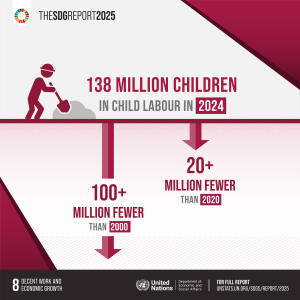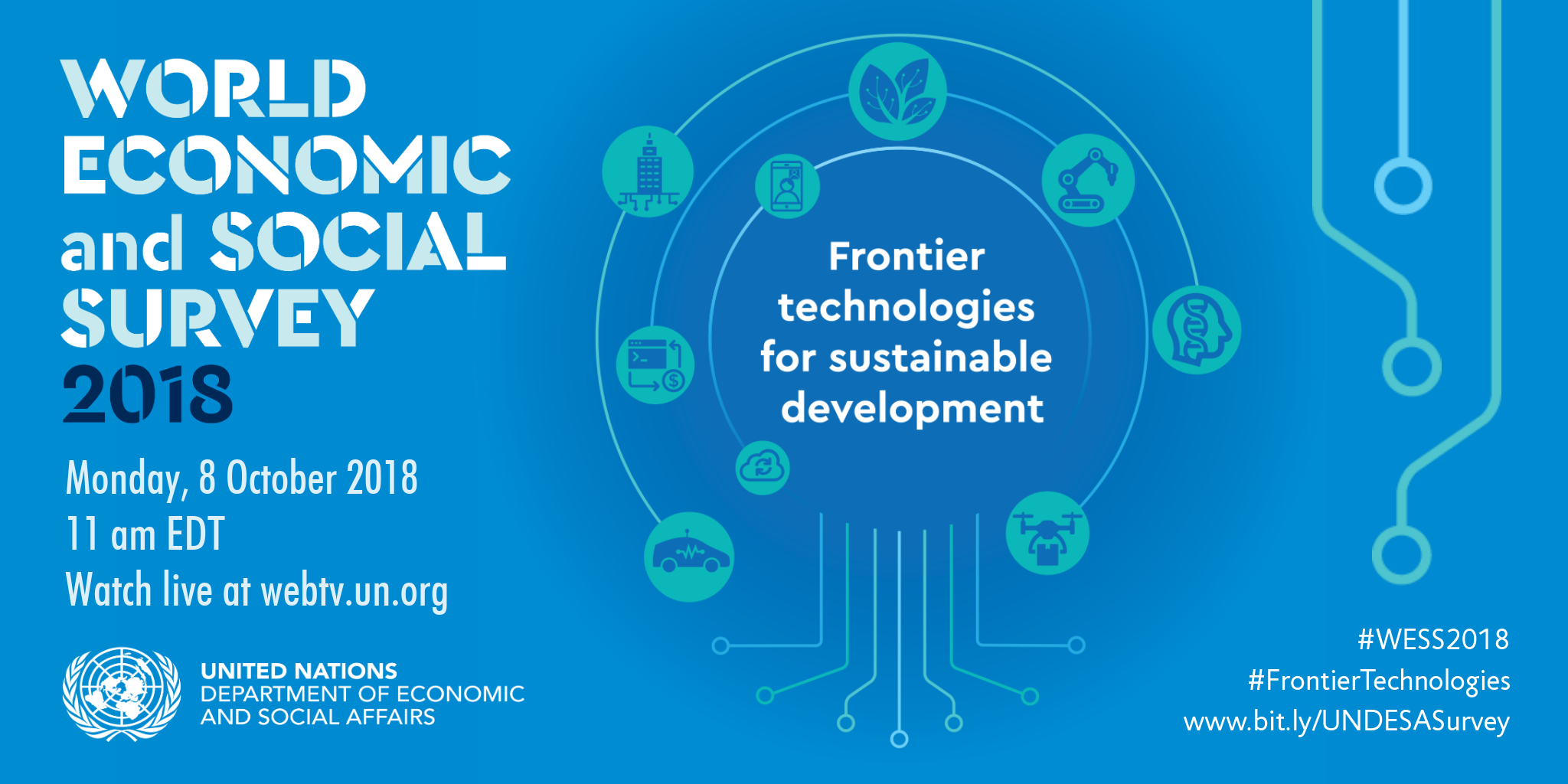Promoting sustained economic growth, productive employment and decent work for all is essential for a sustainable future. Goal 8 focuses on creating quality jobs, promoting entrepreneurship, and fostering economic growth that benefits everyone.
The journey towards achieving Goal 8 faces significant challenges due to the aftermath of COVID-19, trade tensions, rising debt in developing countries and geopolitical conflicts. These factors collectively threaten global economic growth. Although global real GDP per capita saw a rebound in 2021, it experienced a slowdown in 2022 and is projected to slow to just 1.5 per cent in 2025 due to heightened trade tensions and policy uncertainty.
While the unemployment rate fell to a record low of 5.0 per cent in 2024, nearly 58 per cent of workers remained informally employed, with persistently high rates in LDCs and sub-Saharan Africa. However, significant disparities across gender and age persist.
More progress is needed to increase employment opportunities, especially for young people, reduce informal employment and labour market inequality (particularly in terms of the gender pay gap), promote safe and secure working environments, and improve access to financial services to ensure sustained and inclusive economic growth.
Accelerating progress demands sustainable economic policies, support for entrepreneurship and innovation, formalization of the informal economy, safeguards of workers’ rights, social justice, and inclusive employment opportunities, especially for women and youth.
What does “decent work” mean?
Decent work means opportunities for everyone to get work that is productive and delivers a fair income, security in the workplace and social protection for families, better prospects for personal development and social integration.
What are the challenges?
A persistent lack of decent work opportunities, insufficient investments and under-consumption contribute to the erosion of the basic social contract: that all must share in progress. The creation of quality jobs remains a major challenge for almost all economies.
Achieving Goal 8 will require a wholesale reform of the financial system to tackle rising debts, economic uncertainty and trade tensions, while promoting equitable pay and decent work for young people.
Sustained and inclusive economic growth can drive progress, create decent jobs for all and improve living standards.
How many people are unemployed?
The global unemployment rate fell to a record low of 5.0 per cent in 2024, down from 6.0 per cent in 2015. But disparities and vulnerabilities remain in the labour market, particularly for youth and women. Young people aged 15–24 continue to face severe difficulties in securing decent employment: in 2024, 259 million youth — one in five globally — were not in education, employment or training (NEET). Young women face the greatest barriers and are twice as likely to be NEET as young men.
What can we do to fix these issues?
Providing youth the best opportunity to transition to a decent job calls for investing in education and training of the highest possible quality, providing youth with skills that match labour market demands, giving them access to social protection and basic services regardless of their contract type, as well as leveling the playing field so that all aspiring youth can attain productive employment regardless of their gender, income level or socio-economic background.
Governments can work to build dynamic, sustainable, innovative and people-centred economies, promoting youth employment and women’s economic empowerment, in particular, and decent work for all.
Implementing adequate health and safety measures and promoting supportive working environments are fundamental to protecting the safety of workers, especially relevant for health workers and those providing essential services.

- Achieving Goal 8 will require a wholesale reform of the financial system to tackle rising debts, economic uncertainty and trade tensions, while promoting equitable pay and decent work for young people.
- From 2015 to 2023, the global average level of national compliance with labour rights declined by 7 per cent.
- GDP per capita growth is projected to slow to just 1.5 per cent in 2025 due to heightened trade tensions and policy uncertainty. Real GDP growth in Least Developed Countries, estimated to be 3.1 per cent in 2024, remains well below the 7 per cent target.
- While the unemployment rate fell to a record low of 5.0 per cent in 2024, nearly 58 per cent of workers remained informally employed, with persistently high rates in Least Developed Countries and sub-Saharan Africa.
- Globally, labour productivity growth rebounded to 1.5 per cent in 2024 after near stagnation in 2022 and 2023, but remains below the 2015–2019 average of 1.8 per cent.
- In 2024, child labour fell to about 138 million children — a drop from 160 million just four years earlier. Yet, the world has missed its 2025 goal to eliminate child labour, and meeting it within the next five years requires progress to accelerate elevenfold.
- Youth unemployment, while improving to 12.9 per cent in 2024, remains triple the adult rate of 3.7 per cent. Young women are disproportionately impacted.
- In 2024, nearly 9 in 10 workers in sub-Saharan Africa and Least Developed Countries were informally employed, meaning they were not adequately covered by social security arrangements, legal protection or workplace safety measures
8.1 Sustain per capita economic growth in accordance with national circumstances and, in particular, at least 7 per cent gross domestic product growth per annum in the least developed countries
8.2 Achieve higher levels of economic productivity through diversification, technological upgrading and innovation, including through a focus on high-value added and labour-intensive sectors
8.3 Promote development-oriented policies that support productive activities, decent job creation, entrepreneurship, creativity and innovation, and encourage the formalization and growth of micro-, small- and medium-sized enterprises, including through access to financial services
8.4 Improve progressively, through 2030, global resource efficiency in consumption and production and endeavour to decouple economic growth from environmental degradation, in accordance with the 10-year framework of programmes on sustainable consumption and production, with developed countries taking the lead
8.5 By 2030, achieve full and productive employment and decent work for all women and men, including for young people and persons with disabilities, and equal pay for work of equal value
8.6 By 2020, substantially reduce the proportion of youth not in employment, education or training
8.7 Take immediate and effective measures to eradicate forced labour, end modern slavery and human trafficking and secure the prohibition and elimination of the worst forms of child labour, including recruitment and use of child soldiers, and by 2025 end child labour in all its forms
8.8 Protect labour rights and promote safe and secure working environments for all workers, including migrant workers, in particular women migrants, and those in precarious employment
8.9 By 2030, devise and implement policies to promote sustainable tourism that creates jobs and promotes local culture and products
8.10 Strengthen the capacity of domestic financial institutions to encourage and expand access to banking, insurance and financial services for all
8.A Increase Aid for Trade support for developing countries, in particular least developed countries, including through the Enhanced Integrated Framework for Trade-Related Technical Assistance to Least Developed Countries
8.B By 2020, develop and operationalize a global strategy for youth employment and implement the Global Jobs Pact of the International Labour Organization
Related News
Overview – World Economic Situation and Prospects 2024
Overview The latest World Economic Situation and Prospects report for 2024 paints a sobering picture of the global economic landscape. The world economy continues to face multiple crises, jeopardizing progress towards the Sustainable Development Goals (SDGs). [...]
Putting a human face on SDG data
New York, 10 August – Bringing Data to Life is an electronic flipping book that collects and showcases the faces and stories behind the data found in global figures on the Sustainable Development Goals (SDGs). [...]
Are New Technologies the Answer for Accelerating Efforts to Achieve the Sustainable Development Goals?
World Economic and Social Survey 2018 looks at whether frontier technologies will help or harm Monday, 8 October 2018 Room S-237, 11 a.m. The 2018 World Economic and Social Survey looks at how frontier [...]



